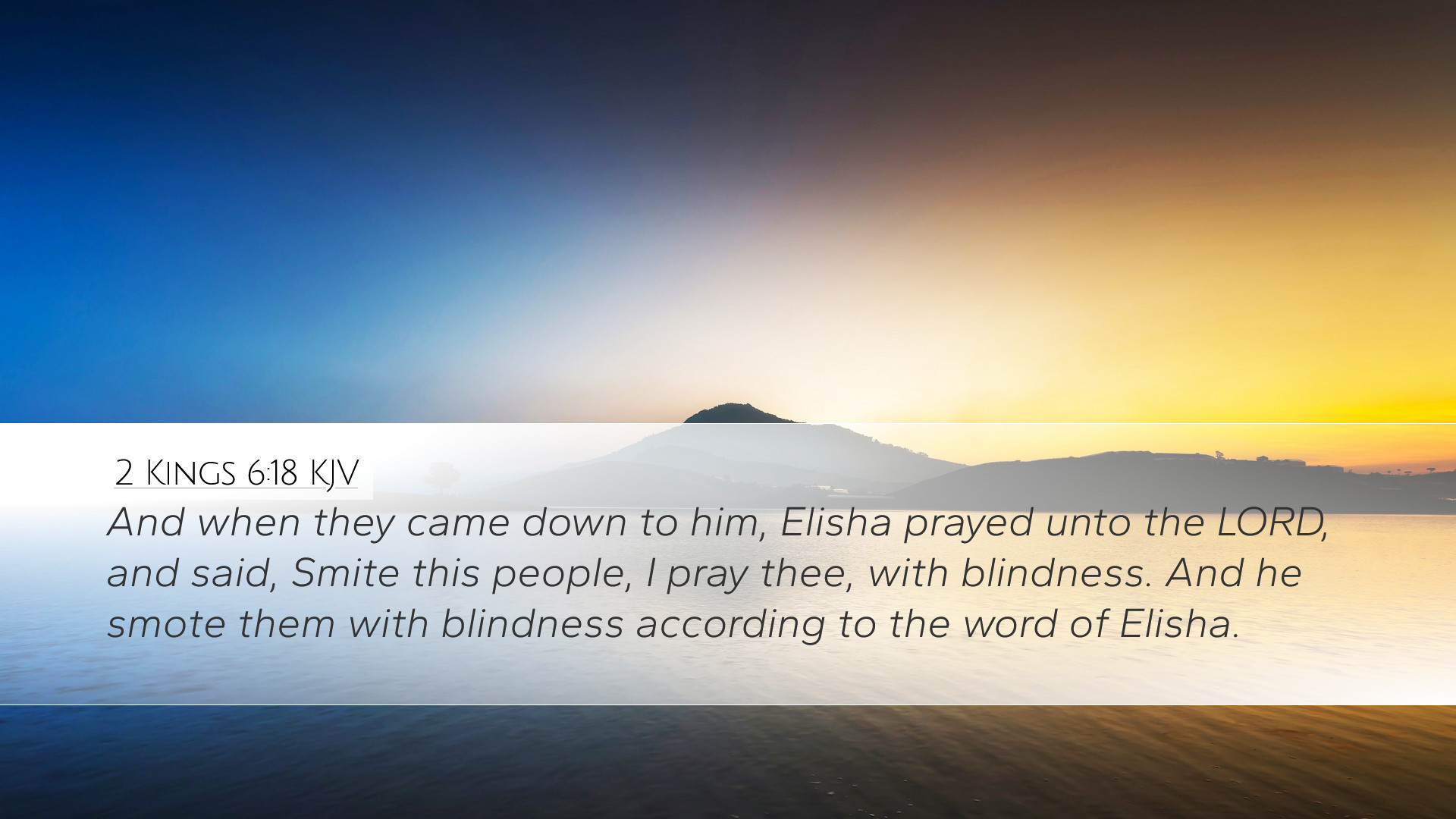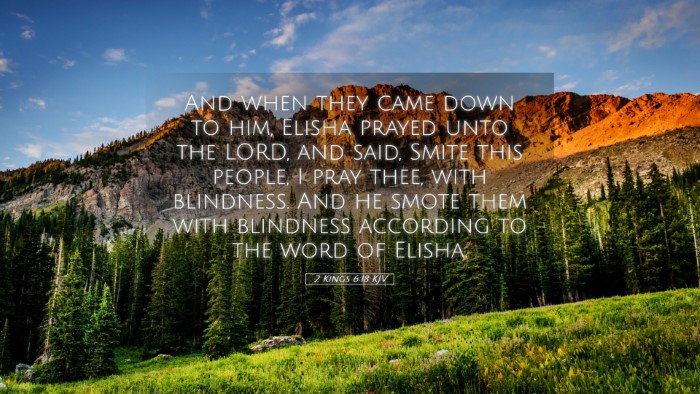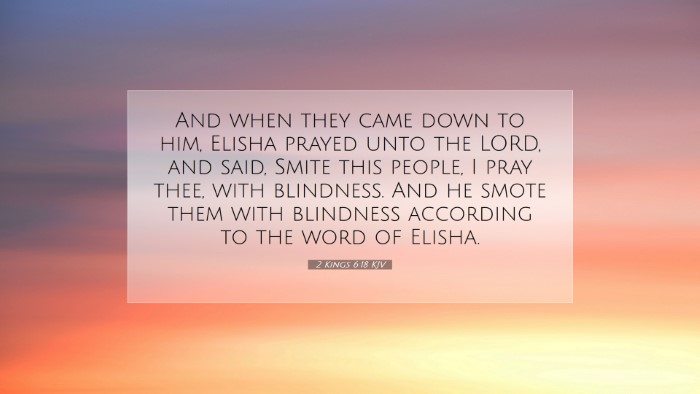Commentary on 2 Kings 6:18
Verse: "And when they came down to him, Elisha prayed unto the LORD, and said, Smite this people, I pray thee, with blindness. And he smote them with blindness according to the word of Elisha."
Introduction
The passage of 2 Kings 6:18 encapsulates a powerful moment in the ministry of the prophet Elisha. It illustrates themes of divine intervention, the power of prayer, and the contrast between spiritual insight and physical blindness. This commentary draws upon insights from notable biblical scholars, including Matthew Henry, Albert Barnes, and Adam Clarke, to provide a comprehensive analysis aimed at pastors, students, theologians, and scholars.
Contextual Background
This verse takes place during a time of conflict between Israel and Syria. The king of Syria seeks to capture Elisha, believing him to be a significant threat due to his prophetic insights into the Syrian military plans. Previous verses depict Elisha informing the king of Israel about the Syrian army's movements, leading to their frustrations with the prophet (2 Kings 6:8-14).
Exegesis of 2 Kings 6:18
Elisha’s Prayer
Elisha’s immediate recourse to prayer reflects his reliance on God in times of peril. As seen in the commentary by Matthew Henry, this act of prayer demonstrates Elisha's spiritual maturity and authority as a prophet. He seeks divine assistance rather than relying on military means, emphasizing the belief that true power is given by God.
Divine Response: Smite with Blindness
Elisha's request to smite the invading troops with blindness reveals the dramatic power of God to intervene in human affairs. Albert Barnes notes that this blindness is not a mere physical impairment but represents a profound spiritual truth; they are rendered incapable of perceiving the truth. This act signifies God's sovereignty over the natural order and His ability to protect His people. It is a manifestation of divine authority where Elisha, as God's representative, enacts judgment on those opposing God's will.
The Nature of Blindness
The blindness inflicted upon the soldiers serves both literal and metaphorical purposes. According to Adam Clarke, the act illustrates the deeper spiritual blindness of those who oppose God. While their eyes are physically opened to Elisha's presence, their understanding remains veiled. This pattern echoes the spiritual blindness present in many biblical narratives, where antagonists are unable to recognize God’s sovereignty and plan.
Theological Insights
Prayer as a Catalyst for Divine Action
This account highlights prayer as a means of accessing divine power. Elisha’s prayer precedes the miraculous act, illustrating the principle that God responds to the faithful petitions of His servants. Such insight echoes through the writings of both Henry and Barnes, reinforcing the idea that believers are called to engage with God through prayer in the face of adversities.
God’s Protection of His People
The divine act of blinding the Syrian troops serves as a protective measure for Elisha and those with him. This mirrors the broader biblical theme of God being a refuge for His people. Commentators suggest that this protection is both strategic and spiritual. Elisha’s ability to invoke divine intervention assures believers of God’s constant presence and willingness to deliver His children when they face opposition.
Practical Applications
Trusting in God's Sovereignty
For contemporary believers, this passage is a profound reminder to trust in God’s sovereignty over circumstances. As pastors and leaders guide their congregations, this verse encourages reliance on God’s wisdom and power rather than human understanding. Henry articulates this sentiment with practical pastoral applications, suggesting that in troubling times, faith should overshadow fear.
The Call to Prayer
The response to crises, as modeled by Elisha, emphasizes the importance of prayer. For students of theology, this passage serves as a case study in effective prayer life and the expectation that God will act when His people call upon Him. The call to prayer should become a foundational teaching in church settings, encouraging communities to unite in seeking God’s guidance and intervention.
Recognizing Spiritual Blindness
This passage challenges all believers to reflect on their spiritual insight. The blindness of the Syrian army serves as an allegory for those who oppose God or live without recognition of His truths. Clarke encourages introspection among Christians to ensure that they do not fall into patterns of spiritual indifference or blindness themselves, which can hinder their relationship with God and their effectiveness in ministry.
Conclusion
The narrative of 2 Kings 6:18 challenges readers to consider the power of prayer, the necessity of divine intervention in human conflicts, and the recognition of God’s authority over all circumstances. The combined insights of Matthew Henry, Albert Barnes, and Adam Clarke encourage a holistic understanding of Elisha’s actions in this moment, urging believers to respond with faith, seek prayer fervently, and remain vigilant against spiritual blindness. As we engage with the text, may we be inspired to trust in God’s provision and protection in our lives and the lives of those we minister to.


